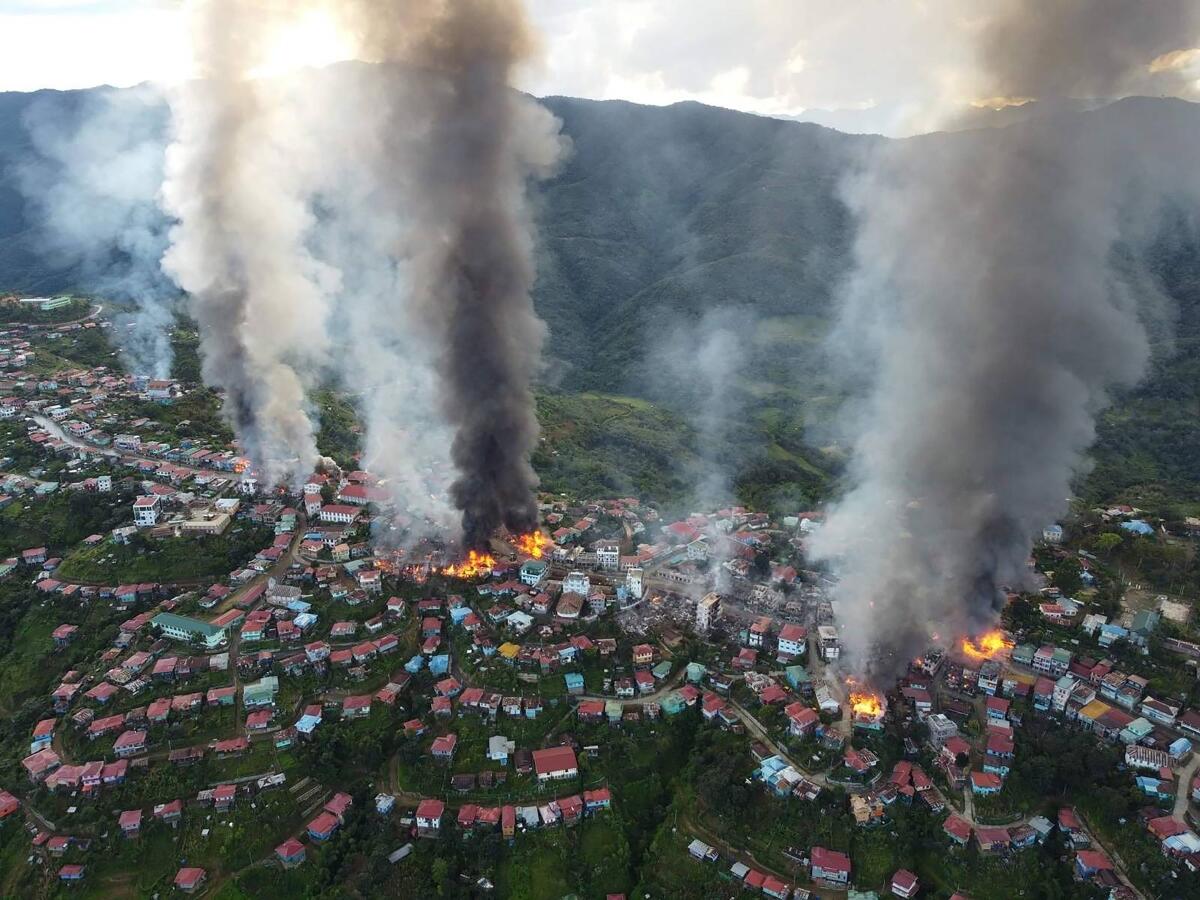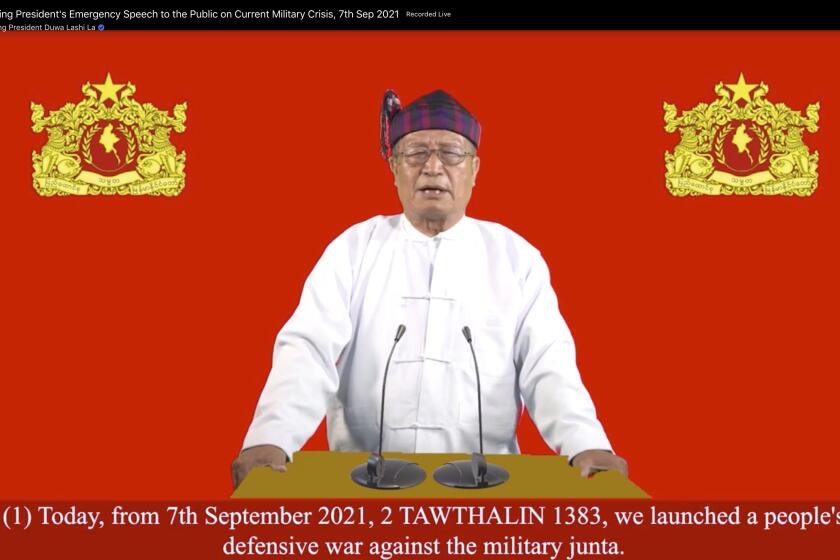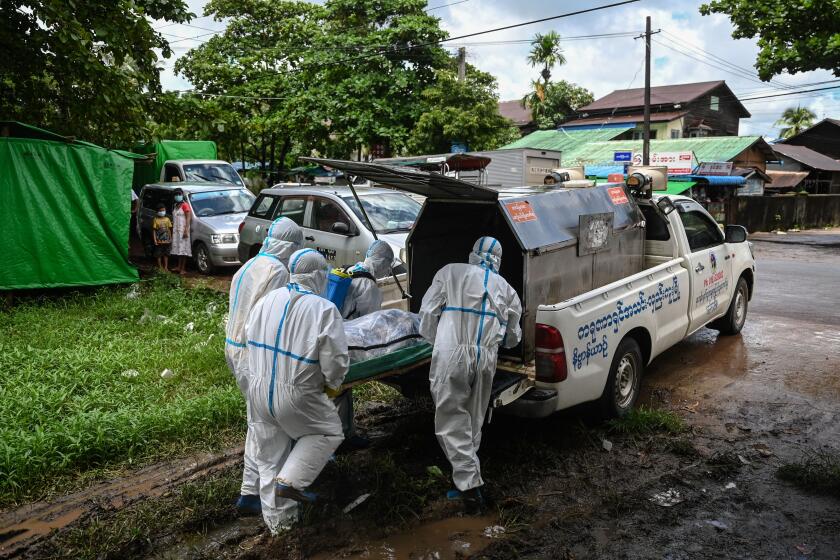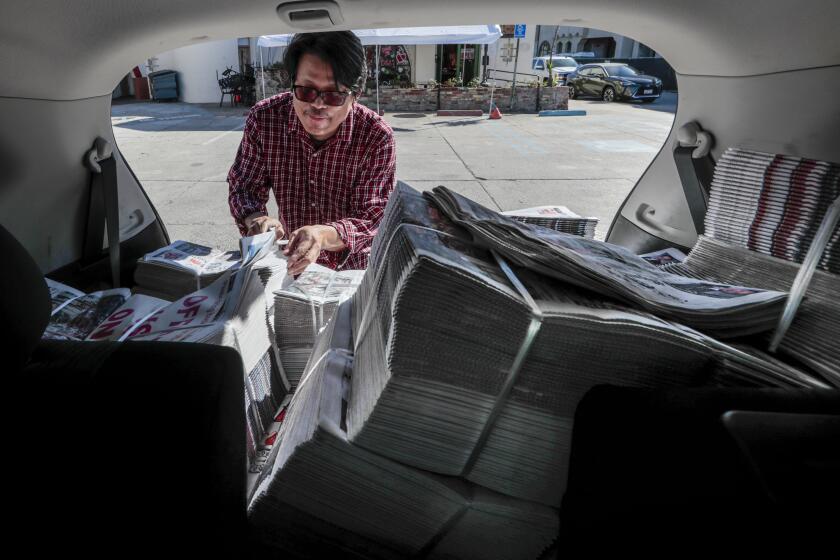More than 3 million people in Myanmar need ‘life-saving’ aid, U.N. says

- Share via
UNITED NATIONS — The United Nations’ humanitarian chief urged Myanmar’s military leaders Monday to provide unimpeded access to more than 3 million people in need of life-saving humanitarian assistance “because of growing conflict and insecurity, COVID-19 and a failing economy.”
Martin Griffiths warned that, without an end to violence and a peaceful resolution of Myanmar’s crisis, “this number will only rise.”
He also urged donors to respond to the U.N. appeal, saying that less than half of the $385 million required has been raised since the military ousted the elected government of Aung San Suu Kyi in a Feb. 1 coup.
Monday was the first anniversary of elections in Myanmar that “were deemed free and fair by domestic and international observers,” U.N. spokesman Stephane Dujarric said. They were won by Suu Kyi’s National League for Democracy, which captured about 80% of the elected seats in the upper and lower houses of parliament. The military rejected the results, claiming the vote was fraudulent.
“The United Nations reiterates its call on the military to respect the will of the people and put the country back on track to democratic transition,” Dujarric said, stressing that the U.N. remains “gravely concerned about the intensifying violence in Myanmar.”
Griffiths’ statement was issued as members of the U.N. Security Council held a closed-door meeting on Myanmar requested by Britain. Diplomats said that Russia and China objected to a proposed statement expressing concern over recent violence, including airstrikes, and reaffirming the council’s support for the country’s democratic transition, but that discussions were continuing.
Months after the Feb. 1 coup, citizens are fighting back against Myanmar’s brutal military. Many say international pressure has yielded no results.
Britain’s deputy ambassador to the U.N., James Kariuki, told reporters before the meeting that London was particularly concerned about the buildup of military action in northwest Chin state.
“We are concerned that this rather mirrors the activity we saw four years ago ahead of the atrocities that were committed in Rakhine against the Rohingya” Muslim minority, Kariuki said. “So we’re very keen to make sure the council is focused and the military know that we’re watching.”
Since Suu Kyi’s ouster, Myanmar has been racked by unrest, with peaceful demonstrations against the junta morphing first into a low-level insurgency in many urban areas, after security forces used deadly force, and then into more serious combat in rural areas, especially in border regions where ethnic minority militias have been engaging in heavy clashes with government troops.
On Sept. 7, the National Unity Government, the main underground group coordinating resistance to the military, called for a nationwide uprising. The group was established by elected legislators who had been barred from taking their seats when the military seized power. Its “People’s Defense Forces” operate in many areas and have received training and weapons from some armed ethnic groups.
Record numbers are dying as Myanmar’s healthcare system all but collapses. Virus-stricken households in Yangon fly flags to plead for medicine, food.
Shortly before her 3½-year term as the U.N. special envoy for Myanmar ended Oct. 31, Christine Schraner Burgener told the Associated Press that “civil war” had spread throughout the country.
She said the U.N. had heard that many soldiers were conducting “clearing operations” in Chin state, and noted that the military’s “clearing operation” in Rakhine state in 2017 saw villages being burned down, women being raped and more than 700,000 Rohingya Muslims fleeing to neighboring Bangladesh.
Griffiths also called the situation in Myanmar’s northwest “extremely concerning, with an escalation in hostilities between the Myanmar Armed Forces and the Chinland Defense Force in Chin state, and with the People’s Defense Forces in Magway and Sagaing regions.”
“More than 37,000 people, including women and children, have been newly displaced, and more than 160 homes have been burned, including churches and the offices of a humanitarian organization,” Griffiths said. “Attacks directed against civilians and civilian infrastructure, including humanitarian workers and facilities, are clearly prohibited under international humanitarian law and must stop immediately.”
Thakhin Kai Bwor is the editor of the Myanmar Gazette, the only Burmese-language newspaper in the U.S. For many readers, it’s also a how-to guide for life in America.
Since Feb. 1, he said, hundreds of thousands of people have been forced to flee their homes because of violence across the country, and 223,000 people remain internally displaced.
“This includes 165,000 in the southeast of the country and is on top of a significant population of people who were already displaced in Rakhine, Chin, Shan and Kachin states prior to the takeover,” Griffiths said. He noted that 144,000 Rohingya people are still confined to camps or living in camp-like settings in Rakhine, many since their displacement in 2012, and more than 105,000 people have been displaced in Kachin and Shan, many for years.
The U.N. undersecretary-general for humanitarian affairs said he is also “increasingly concerned about reports of rising levels of food insecurity in and around urban areas, including in Yangon and Mandalay.”
More to Read
Sign up for Essential California
The most important California stories and recommendations in your inbox every morning.
You may occasionally receive promotional content from the Los Angeles Times.
















